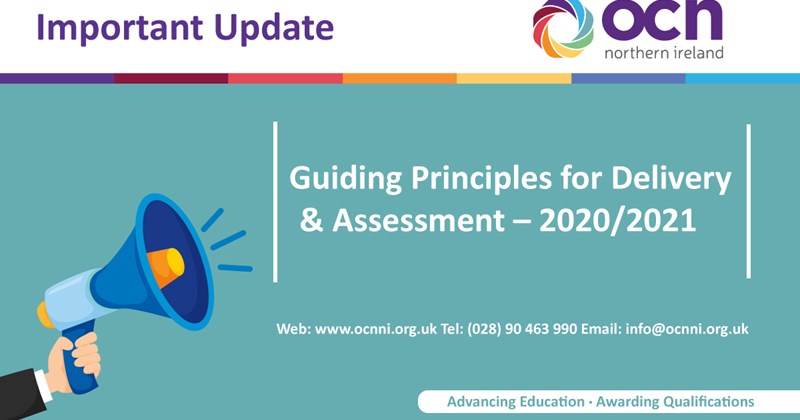
Guiding Principles for Delivery & Assessment 2020-2021
09/09/2020

Dear Head of Centre,
I am writing to thank you and your centre for the hard work and additional pressures you undertook to facilitate the very difficult and demanding situation that we within education found ourselves in between the March to July period of the academic year 2019/20. This was an unprecedented time for everyone involved in the delivery and assessment of learning and required more than ever, significant collaboration between teaching/tutoring staff and awarding organisations.
OCN NI’s guidance through our webinars and supporting documentation, provided centres with the opportunity to present their candidates’ calculated grades (CAG) based on evidential criteria which we reviewed very carefully. In a number of cases, we sought further clarification to ensure that the CAG indicated evidence of achievement. We did not use a statistical or algorithm method to determine the award but rather concentrated on individual CAGs and the most trusted sources of evidence. VTQs were distinct from general qualifications and under Department for the Economy and regulatory instructions, awarding organisations were required to control the awarding process by determining achievement against the most trusted sources of evidence. Consequently, we agreed with the overwhelming majority of CAGs submitted. This is testament to the hard work and professionalism of our centres, their tutors/teachers and internal verifiers.
We are now into a second period of training and delivery within the Covid-19 pandemic and are currently looking at mitigations which will facilitate the delivery and assessment of learners, should there be further interruptions to teaching/training/assessment such as localised lockdowns during the autumn and winter. It is our intention to support learning and ensure that delivery and assessment enable evidential outcomes in a way that is reliable and valid and protects the integrity of the qualifications being undertaken. As per departmental guidance, this anticipates that there will be no calculated assessment grades in the 2020/2021 academic year.
OCN NI will shortly provide guidance to centres to clarify how our mitigations will operate under the extended ERF (Extraordinary Regulated Framework). In the meantime, centres should consider their delivery and assessment carefully to ensure that formative evidence is clearly captured to support assessment decisions, should localised lockdowns occur and cause periodic or temporary interruptions to delivery and assessment.
OCN NI believes there are a number of actions centres can take to mitigate the risk of interruption of learning through localised lockdowns since the government departments dealing with education have confirmed that schools, colleges and training organisations should aim to provide full delivery in the interests of learners and their future education.
- Centres should review how they will mitigate the risk of their learners not compiling sufficient evidence.
- Since our VTQ qualifications are unitised, centres should consider recording informal assessment upon completion of each unit. OCN NI recommends that unit delivery should be systematic with summative evidence being captured progressively as each unit is completed.
- Centres should consider implementing the practice of cumulative informal assessment. This will enable a focussed and reliable indication of learner progress towards achievement and underpin progress with valid and reliable indicators.
- OCN NI recommends that centres identify discrete units in qualifications where there is no reference to learning in other units (e.g. in our Entitlement Framework qualifications: Religious Education - where the discrete units should be taught as early as possible to ensure coverage. Science - OCN NI does not recommend that this subject is taught in a single year due to the risk of interruptions unless there is parallel delivery. That would allow for the collection of formative evidence against each of the discrete subjects).
- Centres delivering Essential Skills at Level 1 and Level 2, which require on demand examination, should consider introducing informal cumulative assessment to provide a reliable picture of learner progress. Centres will already be determining when learners are examination-ready, so this would be a way of validating candidates progress and could be used as a ‘fall back’ where disruption to examination could be caused by localised lockdowns.
- Centres should review Learning Outcomes and Assessment Criteria in the qualification specification to identify and map overlaps in evidence so that unnecessary duplication can be avoided. This could occur where an assessment criterion has been covered more than once in different units and in slightly different ways.
OCN NI is currently considering further guidance on mitigations and will update centres shortly. In the meantime, should you wish to discuss anything further, please contact the Compliance & Audit team at compliance@ocnni.org.uk.
Yours faithfully,
Simon Hamilton
Director of Compliance & Audit
